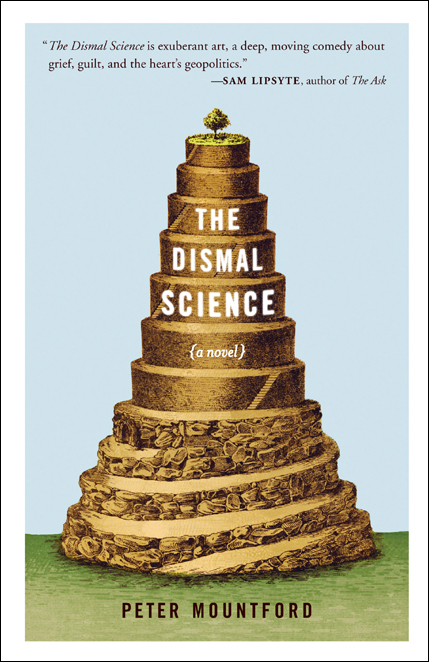
The Dismal Science
A Novel
- اطلاعات
- نقد و بررسی
- دیدگاه کاربران
نقد و بررسی

Starred review from September 16, 2013
Fans of Louis Begley’s About Schmidt and other thoughtfully written novels about the male midlife crisis will appreciate Mountford’s second novel (after A Young Man’s Guide to Late Capitalism). Here he has traded in his “young man” for an older one: 54-year-old Vincenzo D’Orsi, a vice president at the World Bank. A widower with an adult daughter who lives in Brooklyn, N.Y. (with all the requisite piercings and views on the geopolitical scene that run counter to her father’s), Vincenzo lives quietly in Bethesda, Md.—until the day that he makes an unpopular pronouncement at work regarding the new government in Bolivia. Before you can say John Maynard Keynes, Vincenzo finds himself taking early retirement and trying to figure out what to do with the rest of his life. Should he move to New York and go to work for Lehman Brothers? Join a think tank? Go to Bolivia and make a speech? He gets advice on the subject from his daughter; his best friend, Walter (a Washington Post columnist); his attractive Bolivian press liaison, Lenka; and a mysterious black man, Ben, who may or may not work for the CIA. How Vincenzo manages to navigate this new life without nets forms the emotional core of the novel, which intelligently explores his roiled inner life. In the end, Mountford has written a distinctively entertaining novel that illuminates the spiritual odyssey of a contemporary Dodsworth.

November 1, 2013
A savvy, fast-paced second novel about an economist's midlife crisis. Vincenzo D'Orsi is a senior economist with the World Bank in Washington, D.C. The 54-year-old Italian has responsibility for Latin America. In 2005, the radical Evo Morales is a shoo-in to win the presidency of Bolivia, and only Vincenzo has the authority to change bank policy toward that country. The U.S. representative at the bank tries to bully him into an aid cutoff. Not only does Vincenzo resist, he goes public, giving an interview to his old friend Walter, veteran Washington Post reporter. It is a pivotal moment; the move ends his long career at the bank, yet Vincenzo is unsure why he has acted so drastically; he still admires the bank, for all its defects. Mountford manages all this very well: The economics are delivered crisply, and Vincenzo's impulsive exit rings true. The format for the midlife-crisis novel calls for professional and personal self-destruction, and on the personal level, Mountford is less sure-footed, as was also apparent in his 2011 debut (A Young Man's Guide to Late Capitalism). There can be no blowup with his wife, for Vincenzo is a widower. His beloved Cristina was killed in a traffic accident some two years earlier, so it's his relationship with their grown daughter, Leonora, that must speed his self-destruction. He loves her dearly but loathes her boyfriend, which causes his not-entirely-convincing break with her. One welcome tweak to the format comes with Ben, a young black man, who Vincenzo believes is a CIA operative, who shows up out of the blue to threaten Vincenzo if he exacerbates U.S. relations with Latin America; the Italian has no green card and could be deported. But the die has been cast; at the invitation of Morales, Vincenzo travels to Bolivia (the setting for Mountford's debut) with Walter. His required meltdown occurs when he delivers a boozy speech to a large audience in La Paz. A bracingly intelligent work, though ultimately a prisoner of the genre's conventions.
COPYRIGHT(2013) Kirkus Reviews, ALL RIGHTS RESERVED.

February 1, 2014
Malcolm Gladwell would be so proud. Senior World Bank economist Vincenzo D'Orsi reaches a tipping point of epic proportions when a seemingly innocuous conversation with his executive director escalates into the kind of argument in which idle threats are issued and then must be acted upon. Choosing not to step back from the brink, D'Orsi follows through on his ultimatum and leaves his position after a lengthy, if not overly illustrious, career. The domino effect of his actions is swift and all-encompassing. He alienates his daughter, turns on his best friend, sells his house, and walks off into an abyss that began forming in the aftermath of his wife's sudden death. Without a family, home, or career, D'Orsi is free to discover who he is and how he got there, though the answers are not always pleasing. Mountford's wry look at middle-aged identity and transition is a sardonic yet sobering portrait of what happens when a man living a life too narrowly becomes confounded when confronted with too many choices.(Reprinted with permission of Booklist, copyright 2014, American Library Association.)




دیدگاه کاربران